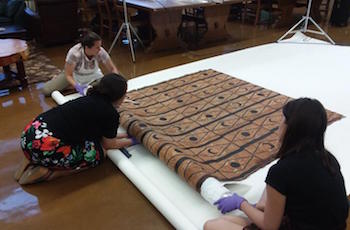Archival students get hands-on experience from home
This spring, as schools, businesses and communities began closing their doors to stop the spread of COVID-19, universities throughout the state and country had to quickly change their way of teaching to ensure the continued education of their students.

barkcloth at the Arizona State Museum.
Wayne State’s School of Information Sciences was uniquely prepared for such a situation as the majority of the school’s classes were already offered online, and had been for more than a decade. There was only a single class in the spring/summer semester that was intended to be taught in person – Library and Archival Conservation.
The class – an elective offered only once every two years – gives students a valuable hands-on experience in which they learn how certain archival items can deteriorate and how to properly handle and preserve those items. Although she had never previously taught an online course, Dr. Christina Bisulca, the Andrew W. Mellon Conservation Scientist at the Detroit Institute of Arts, was determined to make it work.
"We were especially grateful in this time of upheaval to have adjunct faculty member Christina Bisulca agree to re-format the course. The need to abruptly switch from a physical lab-based course to an online one was a huge challenge,” said Kim Schroeder, lecturer, career advisor and coordinator for Wayne State’s archival program. “Dr. Bisulca is incredibly well versed in our field and we are so lucky that she was up to the challenge. The alternative could have resulted in some students delaying their graduation."
Much of the class is geared toward appropriate storage and environmental conditions and ideas about preservation. Bisulca worked to provide students with a list of affordable materials, including PH pens and UV lights, that can be easily purchased to conduct tests on things they are likely to have at home such as newspapers or old books.
“I like my students a lot – I push the chemistry pretty hard and they are troopers,” Bisulca said. “Even if they don’t understand all of it, I think it’s important for students to know where the principals come from. I do a lot more chemistry than most classes offer, and I hope the students understand that most techniques are not hard-fast rules. They are always evolving and protocols may change. I want students to know that they should always question the process – even if they don’t fully understand the chemistry.”
To demonstrate that point, Bisulca shows examples of past techniques that are no longer followed. Things that, at the time, may have been seen as best practices that have changed as new research and technology have become available.
“I like to show students how much damage you can do if you don’t know what you’re doing,” Bisulca said. “There are lots of tape and other products that are offered online than can do more harm than good. Part of this class is learning not only what to look for, but also what to avoid.”
Wayne State is home to one of the oldest continuous archival training programs in the nation and continues to provide real-world training by instructors who are experts in their fields. Bisulca’s extensive experience includes working as a chemist for the Library of Congress in Washington, D.C., and as a senior conservator at the Bernice Pauahi Bishop Museum in Honolulu, Hawaii. The majority of her training was done at the University of Arizona’s Arizona State Museum where she worked as a graduate research assistant while working to receive her Ph.D. in Materials Science and Engineering with a minor in Chemistry (in 2014), and as a research specialist at the museum before joining the Detroit Institute of Arts in 2016.
Library and Archival Conservation (INF 7750) is offered as an elective course in the Graduate Certificate in Archival Administration program. The School of Information Sciences expects to next offer the class during the spring/summer 2022 semester. However, because of the successful transition of the class to an online format and the high level of interest in the course, it may be offered online more frequently in the future.